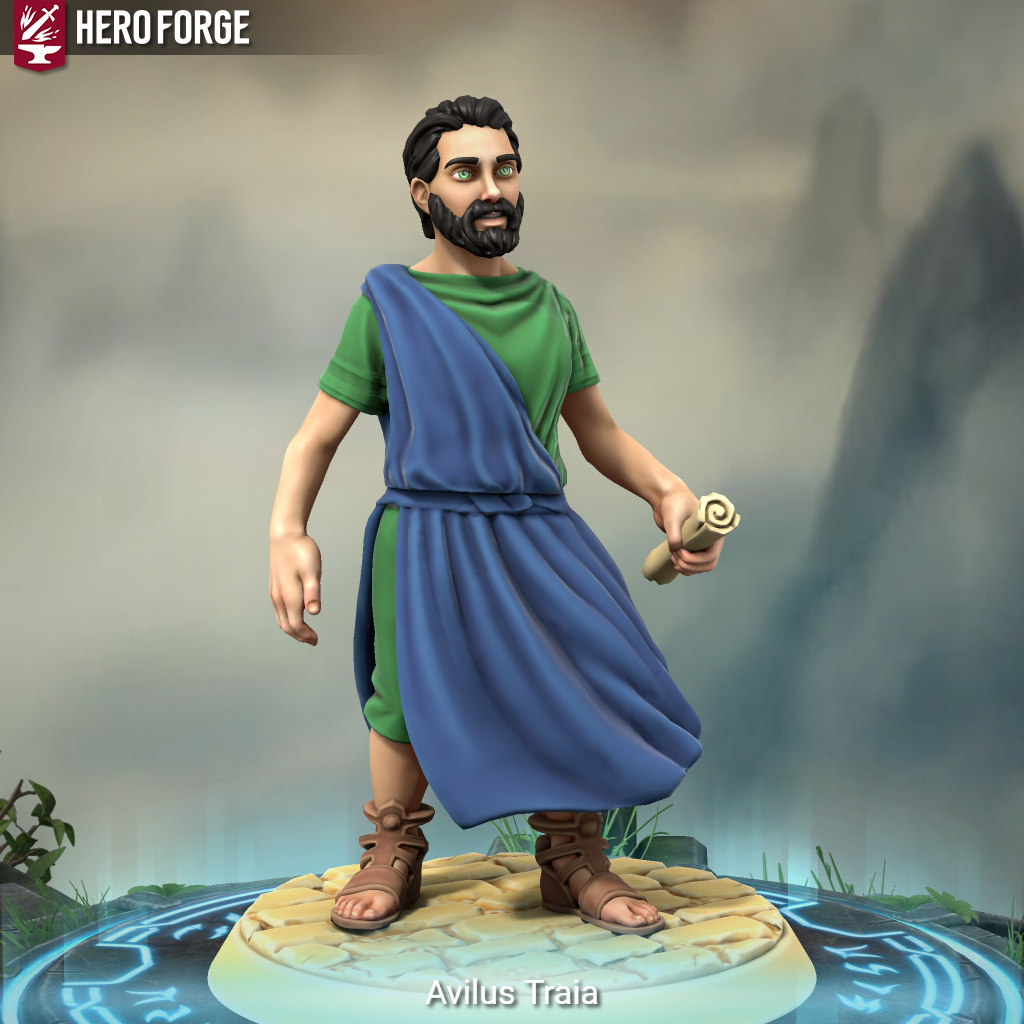Avilus Traia
Dux Avilus Traia
"Traia is a complicated man. There is no doubt he is the man responsible for Solathi being what it is today. Beyond that he is many things to many people - enlightened despot to some, opportunistic monarch to others, patriotic hero and liberator of the Solathine people to others. The truth is probably somewhere in between - mind you, saying that in Solathi is a really good way to be arrested."Avilus Traia was the last provincial governor of the Helikan colony of Solathi, and the first Dux of the City-State of Solathi. He is considered the founding father of Solathi as it exists today, and is still held in reverence among its population.
-from Parro's History of Solathi, found in the Academy of Arikanda
Mental characteristics
Education
Avilus Traia was born in the City-State of Helik in 173 TE to a family in the lower ranks of Helikan nobility. In his youth, Traia studied underneath a number of natural philosophers summoned to his family estate, some from as far away as the Heartlands. His greatest influence was the Helikan natural philosopher Vero Kergas, who gave him a solid understanding in statecraft, philosophy, mathematics, rhetoric and other disciplines. It is said that Kergas may have been the one to first install a sense of political shrewdness in his disciple.
Employment
Helikan Public Service and Parliament
After the completion of his education at around the age of twenty, Traia followed in the footsteps of his parents and took up a position within the Helikan public service, first working as a minor civil bureaucrat handling public works before branching out into legal matters. At the age of thirty, he entered into the ranks of the Helikan Parliament. Underneath the ruling Archon of Helik at the time, Orokosh III, he distinguished himself heading up several public service initiatives. Orokosh saw him as a potential member of his inner circle, and gave Traia the opportunity to distinguish himself by sending him to the colony of Solathi to serve as a governor.Governorship of Solathi
When Traia arrived in Solathi in the winter of 208 TE, he arrived at a time of great wealth flowing out of the city. The lush farmlands of the Galan Delta, combined with the gemstone quarries and mines further upriver made many Helikans in Solathi wealthy. However, this had an on-flow effect towards the farmers, miners and merchants of Solathi, who felt that they were seeing most of the fruits of their labour sent back to a mother city that seemed to give little back. There was also friction between the native Calinani-born citizens of the colony, who mostly occupied the lower rungs of society, and the Sapphran elite, mostly of Helikan origin. Avilus' first challenge was to negotiate this air of hostility and manage a delicate balance between the demands of the Helikan ruling class and the dissent in the Solathine populace. He managed this with mixed results - while being able to quell riots and revolts for the most part, the demands of the people continued to grow, while the wealthy elite in Helik demanded more and more returns on their investments in Solathi.The Ashstorm and Solathine Seccession
Traia's greatest test, and arguably his most distinguished moment, occurred when the Avadian island of Tethos tore itself apart in a massive volcanic eruption in 212 TE, kicking off a series of tsunamis, earthquakes and ashfalls throughout the Calinan Sea known as the Ashstorm. This event devastated countless cities and settlements on both sides of the Calinan. Solathi was hit particularly hard, with its farmlands experiencing widespread crop failure due to a volcanic winter caused by falling ash, and the city itself facing storm surges flooding both the waterfront on the Calinan Sea and the banks of the Galan River bursting. Helik appeared to be focused primarily on its other continental holdings through this period, seeing the cost of intervention in Solathi to be prohibitively high. The ensuing famine saw many individuals begin to starve, and poverty began to raise its head. Desperate to keep the colony flourishing, Traia wrote to the Helikan Parliament and the Archon, pleading for food and resources to be shipped over the Calinan. When this was denied, the exhausted populace finally broke out into revolt in Solathi, refusing to pay taxes and tributes to Helik and seizing the lands and assets of the nobility. As governor, Traia was expected to put down the revolt harshly and enforce Helikan order. However, in a move that shocked everybody, he sided with the angry populace, demanding that the mother city meet its obligations to help its colony recover. When Helik again declined to assist, Traia seized control of the treasury, immediately suspended all tribute to Helik and reached out to Avadian wayfarers to supply foodstuffs and essential materials and labourers by sea. This was a gamble, as it nearly emptied the coffers of the colony and bit into Traia's personal wealth, but it paid off, with Solathi rebounding much faster than other cities in its position and reclaiming its wealth and prestige in fairly short order. To supplement this need to survive independently, Traia began to reorganise Solathi' government, expelling bureaucrats loyal to Helik and instead fostering responsibility and duty to Solathi itself rather than the mother city. This saw the institution of the Dux, the leader of the government, and the Ducal Council, who advised and were delegated power by the Dux. The local garrison was repurposed into the newly formed Solathine Guard, with a similar loyalty to the Dux and the city itself instituted. Near the end of 213 TE, Helikan vessels returned to Solathi, aiming to reclaim their colony and re-institute order. Traia was ordered to relinquish his authority, re-institute tribute to Helik immediately, and return to Helik to face Parliament and possible trial. Avilus' response to the Helikan bureaucracy has been enshrined in history:"I begged you to help Solathi during the Ashstorm, you ignored us, and now you want to bring us back into the fold like nothing happened? Forget it. Tell the Archon that we will go our own way. Your ship's waiting."Traia then proceeded to inaugurate the City-State of Solathi, declaring complete independence from Helik and its own sovereignty as its own state. Helik threatened retribution and reconquest of the rebellious city-state, however it was deemed to be a logistical nightmare to mount a maritime invasion, and Traia's previous arrangements with Avadian sailors left the Archon leery of a disastrous counterattack that they could not hope to win. Thus it was that Helik were forced to withdraw and acknowledge Solathi's sovereignty.
Avilus Traia as Dux of Solathi, wearing a mantle in navy-blue Solathine colours
Later Career
Most of Traia's later career was spent consolidating the government of Solathi, setting up the apparatus that would allow the city to truly stand on its own. The office of Dux remained as the absolute monarch, but Traia's own approach was more of an attempt at a benevolent dictatorship, listening to the Ducal Council and various representatives of the people. He proceeded to set up courts, and instituted governors of provinces outside of the city known as nomarchs. He also strengthened the Solathine Guard, instituting the office of Captain-General. Traia remained in office for a further twenty-one years, most of which were spent painstakingly laying the foundations for the independent state- a highly stressful job that saw him turn to alcohol. It was said that he could go through an entire bottle of Avadian rum by the end of each day. This tragically caught up with him in his early sixties, and he spent his final days succumbing to liver disease. His death was mourned in Solathi for a fortnight throughout the city, and his ashes were scattered into the Calinan Sea as per his wishes as a devotee of the water goddess Essena. He was succeeded by his daughter Elika, who adopted the name Elika Avila to continue his legacy and establised the ruling House of Avila.Morality & Philosophy
Traia was a dedicated believer in the Elemental Gods - in particular the water goddess Essena, who he had a great affinity for. In terms of his philosophies, whilst still an enforcer of aristocracy even after declaring Solathi independent, he was said to value the input of commoners, seeing them as an important part of the Solathine system. With that said, he still believed in the need of a firm hand to guide the nation, and believed the aristocracy was best equipped to do this. It appears that his own philosophy of ruling is that of the concept of a benevolent dictatorship or enlightened oligarchy.
Personality Characteristics
Motivation
There are multiple perspectives on Traia's motivations for his actions during the Ashstorm. Many Solathines of a more nationalistic bent believe that Traia was a morally upstanding man who acted out of a sense of noblesse oblige - and that only by seizing absolute power and severing the cord to Helik could he save the people of Solathi. They believe that these actions in turn made him worthy of the mantle of leadership, which naturally passed to his descendants.
Some contemporary scholars consider the possibility that Traia might have simply been an opportunist who was in the right place at the right time, and exploited the chaos and devastation of the Ashstorm to achieve his own ambitions of becoming a petty king. This opinion is popular in the Helikan League, and is roundly condemned in Solathi itself.
Legacy
Avilus Traia Today
Ultimately, Avilus Traia's legacy has long surpassed his death, and he is still arguably the most important figure in Solathi - and by extension, one of the most important figures in the history of northern Calina - today. Even beyond the most obvious sign - his descendants still ruling as Dux to this day, and the ruling House of Avila bearing his name - he is still a role model for many Solathines and a figure of national pride. Even beyond Solathi, Traia is regarded highly as an example of an oligarch and monarch who could rule through benevolence, and his example has even been grudgingly followed in Helik itself. His treatises are actively studied by natural philosophers throughout Arikanda and Calina, and many rulers and leaders see his career as a cautionary tale - or aspirational, depending on the person - about how quickly power can change hands in a crisis.
Alignment
Lawful Neutral
Honorary & Occupational Titles
Governor of Solathi
Dux of the City-State of Solathi
Father of Solathi
Dux of the City-State of Solathi
Father of Solathi
Life
173 TE
234 TE
61 years old
Circumstances of Death
Liver cirrhosis
Birthplace
Place of Death
Children
Pronouns
He/Him
Sex
Male
Gender
Man
Presentation
Masculine
Eyes
Green
Hair
Black, shoulder length
Skin Tone/Pigmentation
Light tan
Height
5'8"
Belief/Deity
Aligned Organization
Avadian
Calinani




Comments